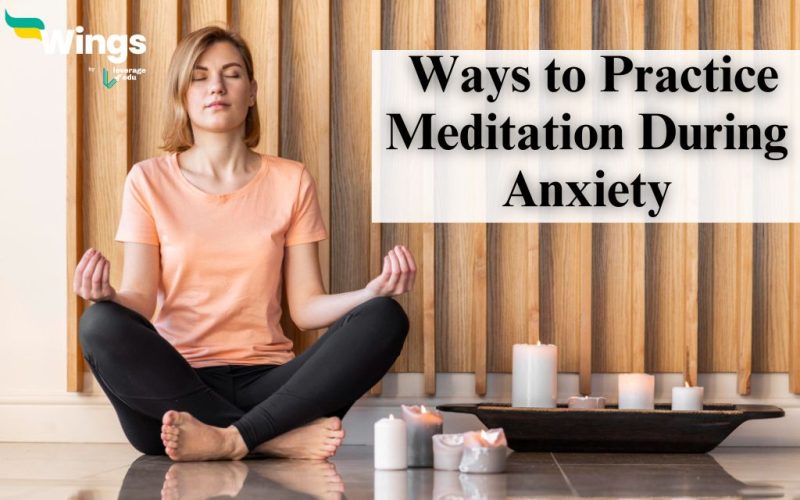Anxiety is a common and overwhelming experience for many people. It can affect every aspect of your life, from work to personal relationships. While seeking professional help is important, there are also several self-help strategies, like meditation, that can significantly reduce anxiety levels. In this article, we will explore nine powerful meditation techniques that can help you manage anxiety and find a sense of calm and balance in your life. To learn about effective mindfulness practices to manage your anxiety, keep reading this blog article till the end.
This Blog Includes:
9 Ways to Practice Meditation During Anxiety
Managing anxiety is an ongoing journey, and meditation can be a valuable tool. The nine techniques mentioned in this article offer a diverse range of approaches to suit different preferences and needs. Check out the below-mentioned mindfulness exercises to practice during anxiety:
Mindfulness Meditation
Mindfulness meditation is a well-known practice that involves focusing your attention on the present moment. By paying close attention to your thoughts, feelings, and bodily sensations without judgment, you can learn to accept them and reduce their power over you. Regular mindfulness meditation can help you become more aware of your anxiety triggers and provide tools to manage them.

Also Read: 10 Ways to Practice Mindfulness for a Healthier Life While Studying Abroad
Deep Breathing Exercises
Deep breathing exercises, such as diaphragmatic or abdominal breathing, are simple yet effective ways to calm your nervous system. By taking slow, deep breaths, you activate your body’s relaxation response, reducing anxiety and stress levels. Incorporate deep breathing into your daily routine or use it as a quick tool whenever you feel overwhelmed.

Guided Visualization
Guided visualization is a meditation technique that involves imagining a peaceful and serene place. By vividly visualizing this place, you can create a mental sanctuary to escape to when anxiety strikes. Guided visualization can be especially helpful for those who find it difficult to still their minds during traditional meditation.
Body Scan Meditation
Body scan meditation involves systematically bringing awareness to each part of your body, starting from your toes and moving upward. This practice helps you identify areas of tension and stress and release them. It’s a great way to reconnect with your body and relieve physical symptoms of anxiety.
Loving-Kindness Meditation
Loving-kindness meditation, also known as Metta meditation, focuses on cultivating feelings of compassion and love, first for yourself and then for others. This practice can help counteract negative self-talk and replace it with self-compassion, which is essential for managing anxiety.
Must Read: Navigating Uncertainties: Tips for Studying Abroad with Confidence
Progressive Muscle Relaxation
Progressive muscle relaxation is a meditation technique that involves tensing and then relaxing different muscle groups. This method helps release physical tension and can be particularly effective for individuals who experience muscle tightness during anxious moments.
Mantra Meditation
Mantra meditation involves repeating a word, phrase, or sound (mantra) silently or aloud. The repetitive nature of this practice can help redirect your thoughts away from anxiety-inducing topics and create a sense of inner peace.
Zen Meditation
Zen meditation, or Zazen, is a form of seated meditation that emphasizes observing the breath and the nature of your thoughts without attachment or judgment. It’s a profound practice that can help you develop a deep sense of inner calm and mindfulness.
Yoga Nidra
Yoga Nidra, often referred to as yogic sleep, is a guided meditation practice that induces deep relaxation. It can be particularly beneficial for those who struggle with insomnia due to anxiety. Through systematic body awareness and relaxation, Yoga Nidra can promote restful sleep and reduce anxiety levels.
Now, take a deep breath, choose a meditation technique that resonates with you, and embark on your path to anxiety relief and inner tranquillity.
Relevant Read: Embracing New Found Independence While Studying Abroad
This was all about effective mindfulness practices to manage your anxiety. For more such exciting and informative blogs, do check out our Health and Wellness page and, stay tuned with Leverage Edu. Also, if you are looking to get an education loan to study abroad, reach out to Fly.Finance.
 One app for all your study abroad needs
One app for all your study abroad needs
















 45,000+ students realised their study abroad dream with us. Take the first step today.
45,000+ students realised their study abroad dream with us. Take the first step today.